Below, please find the link to my full audio interview with Brother Antoine Medley, Host, The Forced Pivot podcast. Afterwards, share your thoughts in the comments section below.
Stay blessed, and continue being blessings.
Below, please find the link to my full audio interview with Brother Antoine Medley, Host, The Forced Pivot podcast. Afterwards, share your thoughts in the comments section below.
Stay blessed, and continue being blessings.
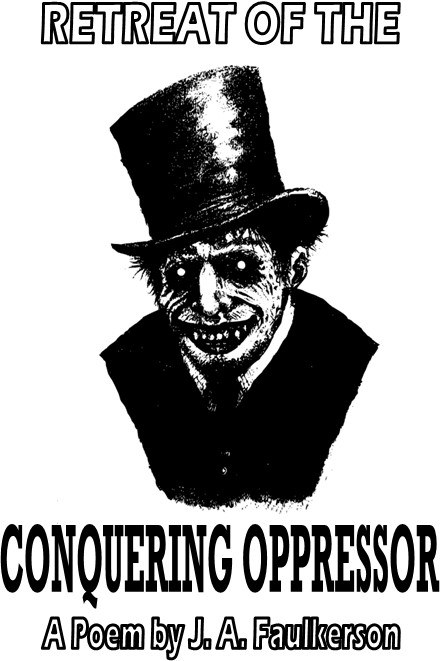
To discover more titles by J. A. Faulkerson, visit https://jafaulkerson.wordpress.com/store/.
You came.
You saw.
You conquered.
You oppressed.
But now you’re reeling, from the impactful but nonviolent haymakers thrown in the 50s and 60s by Rosa Parks, Dr. Martin Luther King, Jr., Mamie Till-Bradley, John F. Kennedy,, Nina Simone, Malcolm X, Ruby Bridges, Lyndon B. Johnson and others.
You, Conquering Oppressor, are trying to hide your depraved state of mind…
….body…
…and soul…
…by telling anyone who will listen that your actions were, and continue to be, permissible because of our skin color, our allegedly being members of a subordinate and inferior caste.
But all you’re doing now is hiding your crimes, the atrocities you committed, and continue to commit, against other human beings.
You know full well these crimes were, and are being, committed in the light of day to advance your priorities, enrich yourself and individuals that look like you, the ones who wear their whiteness like a badge of honor.
We see you.
Or better said, we see right through you, a soul devoid of compassion, an unwillingness to embrace us, your more compassionate neighbors.
Do you ask yourself why we, your compassionate neighbors, remain compassionate, neighborly?
Why we default to nonviolence when it is within our right to violently lash out at you?
I’ll tell you why.
We love you.
As siblings bound together by the blood of the risen Messiah, Jesus Christ.
And because our Lord and Savior is both merciful and transformative, we believe you have the capacity to change for the better.
Better means you, Conquering Oppressor, will come to recognize that your unrighteous acts are driven by hatred, buoyed by a superiority complex.
Better means you, Conquering Oppressor, cannot go it alone, that creating a more perfect union is an all-hands-on-deck proposition.
Better means you, Conquering Oppressor, must develop the capacity to love again, to be faithful to our God, kind to your neighbors.
We see that you’re repulsed by what we’re saying.
We see that you want to retreat to the silo that prevents you from hearing the wise counsel of the compassionate and the neighborly.
But actions speak louder than words.
That’s why we stand before you now, arms spread wide, waiting for you to step forward into our hearty embrace.
We see those tears, a testament to your newfound compassion wanting to see the light of day.
Take that first step, toward us, your compassionate neighbors.
Accept this kiss to your cheek as I accept the one you’re applying to mine.
Redemption feels good, doesn’t it?
Welcome to God’s More Perfect Union.
Copyright 2024 by Jeffery A. Faulkerson. All rights reserved.
To discover more titles by J. A. Faulkerson, visit https://jafaulkerson.wordpress.com/store/.
Did you know that only six percent of traditionally published books among U.S. authors are written by black people?
I didn’t either until one of the organizers of the BLACK WORD MAGIC Authors, Illustrators and Publishers Fair made me aware of this fact during a lengthy telephone conversation in early August 2023. For the longest time, I thought this percentage was much higher, largely due to the success achieved by authors like Alice Walker (The Color Purple) and Terry McMillan (Waiting to Exhale), as well as the late E. Lynn Harris (Invisible Life) and Eric Jerome Dickey (Milk in My Coffee) during the 1990s and early 2000s.
While I had no reason to doubt the BLACK WORD MAGIC organizer’s report, I had to uncover these facts for myself. That’s when I came across an online article, written by Dimitrije Curcic (May 12, 2023), titled Black Author Statistics.
Curcic writes that while the number of black authors among U.S. authors stands at 6.28 percent, the share of black authors among all U.S. authors increased by 19.29 percent in 2020 compared to 2019. “With this huge jump occurring in 2020,” Curcic writes, “black authors were able to recover their 2014 numbers when it came to their share among all authors in the country.”
So, does this mean traditional publishers are more willing than not to publish books written by black authors?
Maybe.
When I continued my reading of Curcic’s online article, I learned that:
The first question we black authors must ask ourselves is, “What costs must we pay to become published authors?” After this question has been answered, we must then determine if the black author-written books currently being sold are written in such a way as to not make white people feel uncomfortable. Knowing the latter will let us know whether the publishing industry continues to allow white prejudice, racism, discrimination and bias to determine which titles are worthy of traditional publication.
The Big Five Publishers – Penguin/Random House, Hachette Book Group, Harper Collins, Simon and Schuster and Macmillan – are not oblivious to the well-funded movement among white American conservatives calling for the banning of books promoting diversity, equity and inclusion. They also aren’t oblivious to this assertion by white American conservatives that American teachers are teaching Critical Race Theory when they reference history specific to black Americans’ struggle for freedom, equal rights and protections under the law. I write this because the publishing industry, just like the Oscars, has always been so white, seemingly suppressing black narratives so members of the white majority won’t be offended.
But know this: white audiences want to read these black narratives. The enlightened members of the white majority want to understand our struggle so they can work with us Blacks to right their white ancestors’ wrongs. More than anything, at least two-thirds of them want to stop the practice of harboring prejudice and bias toward us Blacks, for they know a focus on others (Blacks and other nonwhites) rather than themselves, their racial group, is the key to helping the American union become more perfect.
That’s why the banning of black books and the censorship of Black History are wrong. We Blacks did not achieve victories during Reconstruction and the Civil Rights Movement of the 1950s and ’60s to see a small group of unenlightened, white American conservatives cry foul about how these books and this history make K-12 children and adolescents hate their country. Truly concerned white adults recognize these statements for what they are – lies – and should want their children to read black books and learn Black History so their children can get in touch with their selfless selves. The selfless self demands that one do unto others as he or she would have others do unto themselves. In the words of singer Aretha Franklin, all we Blacks want is a little respect, public displays of sacrificial affection.
But as I sat at my vendor booth at the BLACK WORD MAGIC Fair, watching avid readers of all racial hues flip through the pages of their next great black reads, I concluded that more work needs to be done to get black books into the hands of a diverse group of readers, including Whites. While we black authors have an obligation to write stories that speak to black people’s experiences in America, the fact still remains that many of us black authors just want to produce content that entertains, educates and enlightens.
There are a number of black-owned and operated publishing houses. I found 191 of them on Troy Johnson’s African American Literature Book Club site. Johnson didn’t apply a ranking system to these entries (he organized them in alphabetical order), but ever since I started writing professionally, the ones that I have been hearing about the most are Third World Press, Just Us Books and Triple Crown Publications.
That’s why I’m a fan of the African American Literature Book Club. Johnson created aalbc.com as a place where readers can go to discover books written by both traditionally published and independently published black authors.
But we black authors also need to feel like we’re part of something much bigger than ourselves. That’s why I’m also a fan of the Black Writers Collective and the Hurston/Wright Foundation.
The administrators of the Black Writers Collective are committed to helping us members share and help each other become published authors through a mutual exchange of resources, insights, and sharing of experiences from which we grow.
Founded in 1990 by author Marita Golden and cultural activist Clyde McElvene, the Hurston/Wright Foundation offers in-person summer workshops, virtual courses and award ceremonies that celebrate and amplify black literary voices. Named after esteemed authors Zora Neale Hurston and Richard Wright, both Golden and McElvene believed more needed to be done to promote and honor African American authors.
But the black-owned and operated company that has been most responsible for helping me get the word out about my books is BlackPR.com. Founded by business entrepreneur Dante Lee nearly 25 years ago, BlackPR.com offers the most extensive press release distribution to the Black media that I have seen, and has served over 5,000 clients.
That being said, while it is true only six percent of traditionally published books among U.S. authors are written by black people, the fact remains that we black people are never going to stop writing, sharing our individual and collective truths. If we have the audacity to call ourselves creative writers, our intent is to produce written works that entertain, educate and enlighten. Once our written works have been produced, it is our hope there will be readers standing at the ready to support our efforts with their dollars.
To support my efforts with your dollars, visit my Amazon Authors Page.
Clint Smith’s book How the Word Is Passed bids readers to reckon with the history of slavery across America, but after I read it, I concluded that it does so much more. In an era in which white American conservatives are championing campaigns to suppress black American history and stymie contemporary black American progress, it is a gut-check reminder that Black Americans’ struggle for life, liberty and happiness is far from over. If anything, it’s only the beginning.
Smith trope’s is important to remembering the treacherous road we Americans have traversed just to get to a place where we can even consider the importance of treating each other with decency and respect, regardless of skin color. While it is true that white Americans subjugated black Americans during the Transatlantic Slave Trade and the post-Reconstruction Jim Crow era, and the governmental leaders of these bygone eras tried to make amends for this original sin through the passage of legislation, the fact still remains that too many contemporary white Americans believe that enough has been done to correct their white American ancestors’ original sin.
What Clint Smith makes clear in How the Word Is Passed is that today’s unenlightened segment of the white American majority is committed to perpetrating campaigns designed to suppress inconvenient truths about the Transatlantic Slave Trade and the passage of post-Reconstruction Jim Crow laws. This historical suppression is in line with the conservative Republican Party’s voter suppression in states controlled by Republican governors and legislatures. And they’re using the removal of Confederate statues in places like Richmond and Charlottesville to condition white Americans to rally around whiteness by falsely telling them that the removal of these statues is an affront to what their white American ancestors have built, these United States of America.
But if they would start taking this line of thinking a few steps further, and understand what Clint Smith is getting at when he explains to us how the word is passed, they would recognize that the true change-makers and entrepreneurs were the enslaved Blacks whose uncompensated labor laid the foundation for what this nation is becoming, a more perfect union. In other words, the United States of America was built on the backs of enslaved black Americans. And the only way to truly perfect this union is to acknowledge their white American ancestors’ crimes against other human beings (black Africans), offer contemporary black Americans an apology for their white American ancestors’ crimes against other human beings (black Africans), and compensate the descendants of enslaved black Africans for the next 400 years through reparations. More importantly, though, contemporary white Americans must believe wholeheartedly that all men, humans really, “are created equal, that they are endowed by their Creator with certain unalienable Rights, that among these are Life, Liberty and the pursuit of Happiness.”
Know this, the word that my black African ancestors passed to members of the contemporary Black American Diaspora is that we should use our righteous words and deeds to light the way to the kind of enlightenment that allows all of us to become a reconciled nation of equals.
Here’s Shawnda Patterson telling us how she wrote her first book, The Dating Game: How To Find Yourself While Looking for Mr. Right. Love how she explains her process for independent publication.
Associated Press Sportswriter Cliff Brunt
In the summ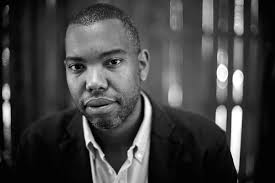 er of 2001, my family and I moved into the Prospect-Lefferts Garden neighborhood in Brooklyn, New York. I was 25. My partner was 24. Our son was 11 months. Prospect-Lefferts Garden is a lovely neighborhood marked by quiet streets and some of the most beautiful architecture in the city. There are several blocks lined with perfectly preserved limestones and brownstones. There is a strong sense of community. Block parties are a tradition. And for those of us who fear the suburbs, Flatbush Avenue hums at the neighborhood’s border. When we moved into the neighborhood, it was predominantly black. A haircut was a two-minute walk away. Great jerk chicken was everywhere. My best friend from college lived on the same block. On Friday evenings you could find us out on his stoop with Jack and Coke in hand (which we drank that back then), watching the world go by.
er of 2001, my family and I moved into the Prospect-Lefferts Garden neighborhood in Brooklyn, New York. I was 25. My partner was 24. Our son was 11 months. Prospect-Lefferts Garden is a lovely neighborhood marked by quiet streets and some of the most beautiful architecture in the city. There are several blocks lined with perfectly preserved limestones and brownstones. There is a strong sense of community. Block parties are a tradition. And for those of us who fear the suburbs, Flatbush Avenue hums at the neighborhood’s border. When we moved into the neighborhood, it was predominantly black. A haircut was a two-minute walk away. Great jerk chicken was everywhere. My best friend from college lived on the same block. On Friday evenings you could find us out on his stoop with Jack and Coke in hand (which we drank that back then), watching the world go by.
Click here to read the rest of the story.
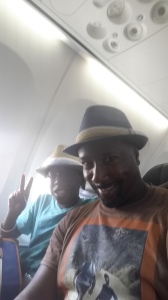 TO PURCHASE J. A. FAULKERSON’S “ADINKRAHENE: FEAR OF A BLACK PLANET”, CLICK HERE.
TO PURCHASE J. A. FAULKERSON’S “ADINKRAHENE: FEAR OF A BLACK PLANET”, CLICK HERE.
On June 23rd, I received an email from Max Rodriguez, founder of the Harlem Book Fair, which, in 2015, celebrated its 17th year of operation. He advised that my debut novel, Adinkrahene: Fear of a Black Planet, had been selected as one of three finalists for a Phillis Wheatley Book Award.
To say I was elated would be an understatement. I was overjoyed, unashamedly floating above, and well beyond, the stratosphere. But now that this news had been shared with me, I found myself sitting on pins and needles in anticipation of being named the First Fiction Book Award winner at the July 17th awards ceremony, which was held on the campus of Columbia University.
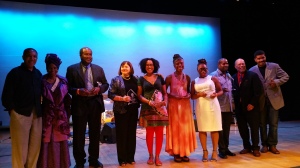 I didn’t win that day. Neither did the other finalist, Amaka Lily, for Shifting Allegiances: A Nigerian’s Story of Nigeria, America and Culture Shock. The award went to Nigeria Lockley for her debut novel Born at Dawn.
I didn’t win that day. Neither did the other finalist, Amaka Lily, for Shifting Allegiances: A Nigerian’s Story of Nigeria, America and Culture Shock. The award went to Nigeria Lockley for her debut novel Born at Dawn.
I think my 11-year-old son took this news the hardest. When New York Times bestselling author Omar Tyree announced the winner, my son exclaimed, “Aw, man! I wanted you to win!”
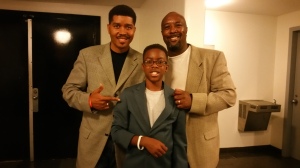 All I could do was peer over and down at him, a smirk masking my disappointment. “It’s okay, buddy,” I told him. “I’m honored from just being named a finalist.” Then, without skipping a beat, I added, “Maybe next year, we can both enter something.”
All I could do was peer over and down at him, a smirk masking my disappointment. “It’s okay, buddy,” I told him. “I’m honored from just being named a finalist.” Then, without skipping a beat, I added, “Maybe next year, we can both enter something.”
He smiled at that.
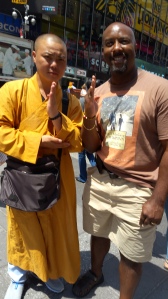 What my son didn’t know was our NYC weekend would be special not because I was being considered for a prestigious award – even though it would have been nice to have won it. It would be special because I was spending it with him. Even before we boarded the Metro train on 72nd Street for the short ride Uptown to Columbia University, we had spent the early afternoon sightseeing in Times Square and eating lunch at the Bubba Gump Shrimp Company.
What my son didn’t know was our NYC weekend would be special not because I was being considered for a prestigious award – even though it would have been nice to have won it. It would be special because I was spending it with him. Even before we boarded the Metro train on 72nd Street for the short ride Uptown to Columbia University, we had spent the early afternoon sightseeing in Times Square and eating lunch at the Bubba Gump Shrimp Company.
While walking the streets in and around Times Square, I received a peace blessing from a Chinese monk.
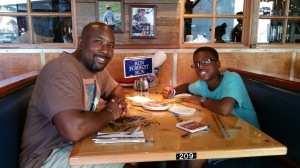 My son marveled at the sight of a woman dressed as the Statue of Liberty (standing completely still for several, long minutes), and the Naked Cowboy playing his guitar, curbside, for his adoring female fans.
My son marveled at the sight of a woman dressed as the Statue of Liberty (standing completely still for several, long minutes), and the Naked Cowboy playing his guitar, curbside, for his adoring female fans.
And I fought, to no avail, to avert his eyes as we walked past two women clad in body paint, high heel shoes and shiny shorts that left little to the imagination.
The next day, Saturday, we walked from the Hotel Beacon to the Starbucks across the street for breakfast. After we received our breakfast orders, I explained the game plan to him. We would catch the Metro on 72nd Street for the short ride Uptown to 135th. Once there, we would locate our vendor booth along a street next to the Countee Cullen Library for the daylong Harlem Book Fair. From there, we would proceed to sell our books to the hordes of readers that would be swarming around our booth.
He nodded, letting me know he was game. But then it happened. It started raining, cats and dogs really. All I could do was nod my head as my heart sank. We had flown from Dallas to New York City to sell our books, and now we were going to be forced to contend with the rain.
The two previous times I had attended the fair, rain had never been in the forecast, only sunny skies and the accompanying heat. Lucky for us, the rain went from a torrential downpour to a sprinkle. And by the time we emerged from the 135th Street subway station, it had stopped completely.
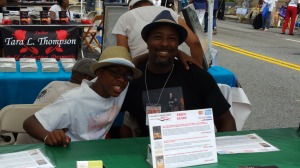 Selling books at the Harlem Book Fair was a transformative experience for my son and me. As people stepped to our table to inquire about our titles, we had to dig deep to give them good reasons to purchase them. I told them that the first book in the Adinkrahene series is all about introducing readers to a new reality, one in which a select group of Black men and women (100 total) are lower-case gods, and they mainly use their supernatural abilities to establish peace and prosperity for all, not exact vengeance upon their enemies, the Anglo-controlled (but Satarian-possessed) Corporate Cabal.
Selling books at the Harlem Book Fair was a transformative experience for my son and me. As people stepped to our table to inquire about our titles, we had to dig deep to give them good reasons to purchase them. I told them that the first book in the Adinkrahene series is all about introducing readers to a new reality, one in which a select group of Black men and women (100 total) are lower-case gods, and they mainly use their supernatural abilities to establish peace and prosperity for all, not exact vengeance upon their enemies, the Anglo-controlled (but Satarian-possessed) Corporate Cabal.
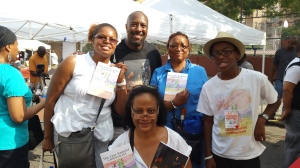 My son told his readers that the Leaf Knight (from his The Leaf Knight Chronicles: The Knightly Origins) is an 11-year-old boy destined to fulfill a prophecy. And when he added that the story and illustrations were all penned and drawn by him, these same readers didn’t hesitate to reach for their wallets (and purses) and pay him for autographed copies of his book. All this proud poppa could do was smile, because it became crystal clear to me that, on this day at least, he would be the most popular author working under the Culturally Coded Content banner.
My son told his readers that the Leaf Knight (from his The Leaf Knight Chronicles: The Knightly Origins) is an 11-year-old boy destined to fulfill a prophecy. And when he added that the story and illustrations were all penned and drawn by him, these same readers didn’t hesitate to reach for their wallets (and purses) and pay him for autographed copies of his book. All this proud poppa could do was smile, because it became crystal clear to me that, on this day at least, he would be the most popular author working under the Culturally Coded Content banner.
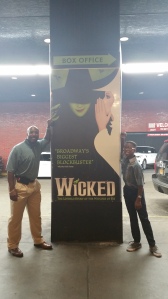 We celebrated that night by going Downtown to see the Broadway play Wicked. Seeing this play had been on my to-do list since my days as Director of the Bruce Wells Scholars TRIO Upward Bound Program (2001-2005). That was more than 10 years ago. But as I sat there, with my son, watching actors bring novelist Gregory Maguire’s words to life, I daydreamed about what life would be like to have stage and screen actors do the same for my novels, short stories and screenplays.
We celebrated that night by going Downtown to see the Broadway play Wicked. Seeing this play had been on my to-do list since my days as Director of the Bruce Wells Scholars TRIO Upward Bound Program (2001-2005). That was more than 10 years ago. But as I sat there, with my son, watching actors bring novelist Gregory Maguire’s words to life, I daydreamed about what life would be like to have stage and screen actors do the same for my novels, short stories and screenplays.
Only time will tell. My son and I just have to keep doing what is necessary to grow as writers.
When I first started this journey, my goal was not to become a hack, kicking out book projects that didn’t add value to readers’ lives. My goal has always been to produce creative works that speak to the relationships that we humans share, both individually and collectively. Having my debut novel selected as a finalist for the 2015 Phillis Wheatley First Fiction Book Award lets me know I’m a good writer. I must now be about the business of becoming a great one.
###
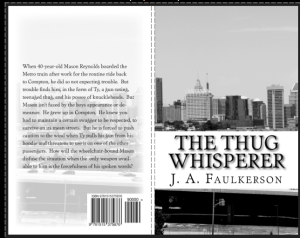 “That’s my seat,” the Black, teenage thug loudly exclaims as he, and three of his boys, all Black, step off the platform and into the subway car. “Get up.” I watch as his large hands become fists and he steps closer, invading the suited, White man’s personal space. “Now.”
“That’s my seat,” the Black, teenage thug loudly exclaims as he, and three of his boys, all Black, step off the platform and into the subway car. “Get up.” I watch as his large hands become fists and he steps closer, invading the suited, White man’s personal space. “Now.”
The stern expression on the suited, White man’s face lets me know he’s not accustomed to backing down from a fight. But this fight is one he knows he can’t win. The tightening of his grip around the briefcase in his lap lets me know he’s protecting something of value, a laptop computer perhaps. He has probably ridden the Metro numerous times, from Downtown Los Angeles to the M.L.K. Transit Center/Compton Station, but this is the first time he has been accosted by the local thugs.
I almost feel sorry for the man. Like me, all he wants to do is get home without incident after spending eight hours or more at the office. I have him pegged as a show runner with one of the local studios, but the pocket-protected pens and markers in the front, left pocket of his button-down shirt gives me second thoughts.
He undoubtedly is an accountant at one of the local banks.
But how can I feel sorry for him? My skin is as dark as the pesky thug’s. By virtue of being born Black, I’m supposed to side with him, right?
Stick it to the White man, take what they are unwilling to relinquish on their own, right?
The Black, teenage thug grabs the man by his collar, effortlessly lifts him from the seat. Members of his entourage snicker in the background, patiently waiting on the punch line to some sick joke. Hanging from the Black, teenage thug’s bent arm now, the suited, White man nervously looks up at him, seeking permission with his eyes to be excused.
The Black, teenage thug releases him. The suited, White man immediately turns on his heels to seek refuge in the adjoining car. The Black, teenage thug claims the now-empty seat, high-fiving a lighter-skinned member of his entourage.
An angry scowl on the face of the old, White man seated just to the right of me doesn’t go unnoticed. He is dressed in all black, with a preacher’s collar, and the little hair that remains on his head is combed over to cover a bald spot.
“You need to stop eyeballing me, old man,” the Black, teenage thug says, his unbelted, denim jeans now six inches below his waistline. He stands briefly to pull his pants up over his boxers, then sits. His gaze falls on me.
Pointing, he says, “Hey, y’all, look at Wheels over there.” Eyes above smiling faces now shift to me.
“Bet not get him mad, Ty,” a member of his entourage interjects. “He’ll run you over.”
“Why do you people act the way you do?” Preacher Man gruffly says, his arms crossed.
The Black, teenage thug now known as Ty doesn’t hear him, but a member of his entourage does. “What’s that you say, old man?” the member asks. Everyone’s attention shifts to Preacher Man as the thug who heard him stands, readying himself for a fistfight.
Preacher Man continues, “We give you space, yet you still feel the need to mock and terrorize us. Why? For laughs? I think not. You don’t care. About yourselves, the legacy of your people.”
Ty leaps from his seat while reaching for the revolver in his right jacket pocket. He stands in front of Preacher Man, his revolver pressed firmly against Preacher Man’s temple. Preacher Man’s arms are at his sides now, and his eyes are shut. Must be making amends with God, for he probably fears the end is near.
“He’s right, you know?”
Ty turns to me, revolver still pressed firmly against Preacher Man’s temple.
“You don’t care. About yourselves, the legacy of our people.”
Copyright 2015. Jeffery A. Faulkerson. All rights reserved.
CLICK HERE TO PURCHASE “THE THUG WHISPERER”